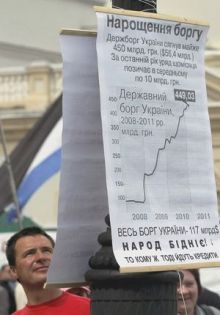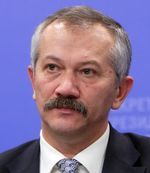The World Bank (WB) hinted in a report last week that the IFC annual investment plan money might become Ukraine’s only source of international loans. Washington is allegedly “tired” of the Ukrainian government’s unfulfilled promises, and the IMF is seriously mulling over terminating the Stand-By Arrangement with Ukraine.
The document emphasizes that the exposure to European banks is high and Europe’s banking crisis or bank deleveraging can cause financial instability in Ukraine. “These risks cannot be mitigated by the World Bank; however, the experience during the 2008-09 crisis also suggests that the authorities can and do act quickly at times of crisis to regain access to financing,” the document reads.
Incidentally, the day before the WB’s Country Partnership Strategy for Ukraine got media spotlight, National Bank of Ukraine Governor Serhii Arbuzov had made a very significant and somewhat unexpected statement. “This year the NBU is also taking necessary measures to maintain a normal – surplus or zero – balance of payments, and I can assure you that the flow of currency will also be predictable. I mean we see no preconditions so far for a major devaluation or revaluation,” the National Bank’s website quotes him as saying. “Nothing is currently posing a threat to the national currency’s stability. The NBU is taking all the necessary measures to maintain a stable balance of payments, on which the stability of the national currency directly depends.”
Meanwhile, it is not only the economic analysis of Ukrainian realities that catches the eye in the WB Strategy. A demand, as persistent as that of the IMF, that household fuel prices be raised resembles a thinly-veiled political pressure, which can be clearly discerned in the phrase about “testing the government’s resolve, especially ahead of the parliamentary elections in 2012.” Yet some of The Day-polled experts broadly hinted that what is really standing behind the creditors’ economic and political demands is concern about the so-called political prisoners. But there is also a different viewpoint: if the government cares so much about the destiny of the country and its people, it might as well sacrifice its soft armchairs in the name of them.
Yet a source close to the government told The Day that terminating the Stand-By Arrangement in no way means breaking off relations with the IMF. He also recalled some instances in the history of Ukraine, when the latter had to renounce an agreement with the IMF. In that case, a new loan agreement was negotiated. This occurred more than once, The Day’s interviewee emphasized. This option is also possible in theory now, but the extension of the current agreement directly depends on the results of gas price negotiations with Russia. The present-day level of household gas prices is prompting the IMF to make excessive demands as to raising the rates.
But the Ukrainian side cannot accept this, the expert notes. And, as the gas contract with Russia has not yet been signed and no one knows what the gas price for Ukraine will be, it is very difficult to foresee what will happen to the IMF arrangement. Once this agreement is signed, there will be additional talks with the Fund to outline further development of the macroeconomic situation in Ukraine. The source says the IMF is insisting that we adjust our finances or at least explain how we are going to fill in budget gaps, especially in the budget of Naftohaz.
To pay off the IMF debt due this year, Ukraine has no alternative but to seek out loan-up sources. What is worse, the “other” loans will be far more expensive, the source says. There is a way out: the Ministry of Finance and the National Bank must seize the new opportunities – they should make use of individual foreign-currency savings. The first successful issues of these bonds show it was a right decision, the interviewee asserts. But he says commercial banks are very reluctant to offer the populace this service. They will find it far more lucrative to lend the government individual deposit funds at a 9-percent interest rate, for which they themselves pay 6 percent. But even this is much cheaper than the credits that private investors, Russia, and China can make available to Ukraine. The problem is that the government will not, of course, opt for utility rate increase in an election year, the official sums it up.
What will happen to this country’s financial security if the IMF really dissolves the agreement? Who is prepared to become our alternative source of financial infusions, and what kind of danger will this turn represent for us and the world’s geopolitical map? The Day asked some experts to answer these questions.
COMMENTARIES
WE MUST DISPEL THE ILLUSION THAT THE IMF WILL BE PERFORMING CHARITABLE FUNCTIONS
Viktor PYNZENYK, ex-Minister of Finance, Ukraine:
“The IMF did not resolve to cancel the program. But there is a danger of a scenario like this. The funding program has been idle for a year now. The program suspension is in itself the consequence of the so-called program reviews and the ensuing visits and consultations which allow, in normal conditions, the issue of the next installment.
“But this cannot continue forever. All the more so that it is the second instance since 2008. In 2009 the program was suspended and then canceled. But, at the time, a new program was being negotiated concurrently.
“What caused the two suspensions is the same thing: failure to meet economic program commitments.
“Ukraine is now facing the problem of maintaining one of the fundamental balances – the flows of foreign payments (a.k.a. balance of payments). The trade part of the last year’s balance came closer to the 2008 level of 18.5 billion dollars and made up 14.2 billion. As far as credits are concerned, we must pay off about 50 billion dollars within a year. The reserves are fewer than 31 billion dollars. Hence is our extreme vulnerability to refinancing the old debts. But, first of all, there should be signals from the Ukrainian side. In my view, the guiding principle will be ‘chairs in the morning, money in the evening,’ not the other way round.”
“CANCEL” IS A DRAMATIC WORD
Oleksandr PASKHAVER, president, Center for Economic Development:
“The IMF is just acting by the book: it only gives money if the joint agreement is being fulfilled. There must always be some political pressure, but the fund is usually guided by the abovementioned rule. So if the loan conditions are satisfied, cooperation will be resumed.
“The word ‘cancel’ is so dramatic that it implies: ‘I won’t play with you any more.’ The IMF will not do so. It will stop giving Ukraine money for some time, but it will not discontinue cooperation because we are an IMF member. We are just not fulfilling the agreement for objective reasons because this follows from, I would say, the whole constitution of our government which finds it difficult to carry out any radical change in the system of any, including economic, governance. Take, for example, a simple demand to spend according to what we have, i.e., spend the incomes, not the losses. So these demands are unlikely to be met. As a result, we will have big problems with the IMF, and the latter is unlikely to give us additional money in the near future.”
BY SHOWING OBSTINACY, WASHINGTON RISKS LOSING UKRAINE TO RUSSIA OR CHINA
Viktor LYSYTSKY, economist, ex-head of a group of advisors to the NBU head:
“Should Ukraine lose the IMF, this will result in essential losses on foreign markets, such as reduction in foreign investments and termination of cooperation projects with other countries. For, whatever may be said about the IMF, its attitude to a country is one of the determining factors for an investor to decide whether or not to deal with this country. It is not at all in Ukraine’s interests to make its potential partners worry again.
“The IMF has repeatedly emphasized that its work is aimed at maintaining monetary stability. They are taking a very pragmatic attitude to the questions of democracy. A democratic setup and monetary stability are different things. There can be very little correlation between them. Greece is the proof of this.
“We will be able to make a deal with them to improve the rule of the game. But if they choose to switch to the language of political categories, they will be pushing us towards a closer alliance with Russia. The world is competitive. Should the IMF fail to give Ukraine money, Russia and China will do so, as Vice-Premier Sehii Tihipko has said before. Washington’s main decision-makers should be aware that, by showing obstinacy, they risk losing Ukraine to their rival and losing the whole game. Ukraine can be a key partner in the US’s rivalry with Russia and China.”
WE ARE MOVING IN A WRONG DIRECTION
Volodymyr LANOVY, ex-Minister of Economics, Ukraine; president, Center for Market Reforms:
“I think the arrangement will be canceled. The first factor is lack of any prospect in issuing a loan because the financial and macroeconomic situation in Ukraine is only worsening. In other words, there is a gap between the purposes of the loan and the results of its utilization. The second factor is a debt crisis in Europe and inadequate resources for supporting the untrustworthy states. The third factor is a worsened overall economic and democratic climate in Ukraine.
“To have the decision changed, Ukraine must change its leadership. We need entirely different approaches. All that is being done is, unfortunately, hampering both economic and socioeconomic development.
“On the whole, the government should, firstly, stop, adopt a surplus state budget, and create conditions for encouraging export (automatic VAT refund, etc.). Secondly, it should reduce purchasing gas from Russia. Thirdly, it should stop banks from crediting the budget deficit and the projects that are being carried out via the stabilization fund, cut interest rates, and increase trustworthiness.
“Should the Stand-By Arrangement still be canceled, the government will have to depreciate the hryvnia’s rate this year. But there will be no ‘end.’ The economy is flexible. There will be a gradual devaluation of the hryvnia, which governmental officials want because they must discharge international debts.”












